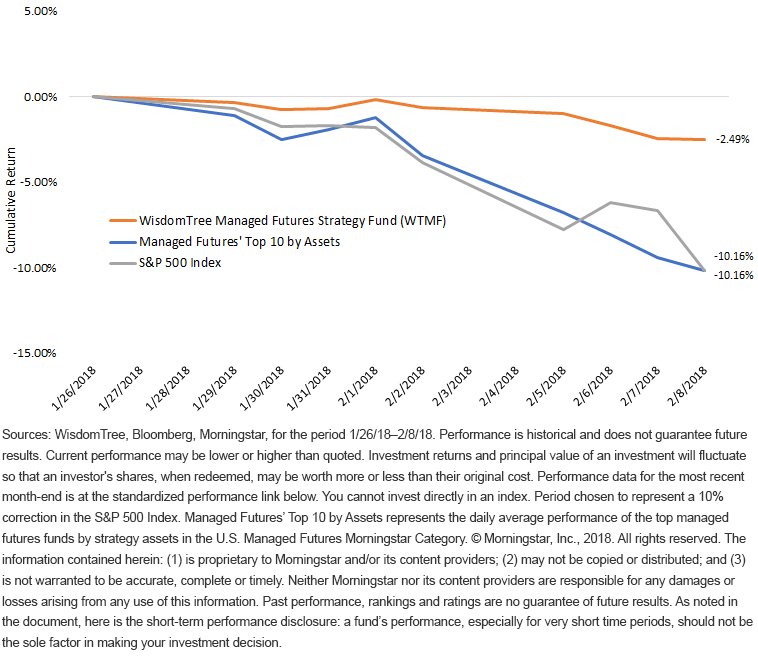Did We Forget about Diversification Again?


When building strategic allocations, most investors start with a belief that it is not good to have all your eggs in one basket. But over time, without a proper rebalancing framework, portfolios drift due to momentum and new allocations often incorporate a recency bias (i.e., based on recent performance).
This recency bias—prior to market events of the last few weeks—led some investors to be over-weight in the U.S. equity market and avoid traditional portfolio “diversifiers.” With volatility picking back up, it is a good time to review whether portfolios are properly diversified.
The managed futures asset class made a name for itself in 2008 when it provided downside protection during one of the worst sell-offs in history. When making new investments the first few years after the crisis, everyone always seemed to ask “what was the performance in 2008?” because the pain from that year was still fresh. Fast forward a few more years, and the question became “what was the performance since the low?” because people became more focused on keeping up with the strong upward returns.
It had been around 400 days since the S&P 500 Index saw a 5% pullback and 500 days since there was a 10% correction, allowing markets to compound higher and pushing volatility to record lows.1 It’s no surprise that looking at the performance of a low or negatively correlated asset class against equities in a strong bull market might lead you to conclude there is no longer a need for that asset class, but the recent sell-off might have reminded people again about the importance of diversification.
The WisdomTree Managed Futures Strategy Fund (WTMF) seeks to achieve positive total returns that are not directly correlated to broad equity or fixed income markets and to profit in rising or falling markets. This is achieved through an investment mechanism that can go long or short in a basket of commodities, interest rates and currencies. WTMF uses a quantitative composite momentum framework to determine whether to go long/short an asset class and resets its exposure on a monthly basis. It also employs risk controls by removing the most volatile contracts and scaling the positions based on conviction of the composite momentum framework.
The managed futures asset class is broadly defined and processes may differ between strategies, but one major difference between WTMF and some of its largest competitors regards the inclusion of equity futures. WTMF does not include equity futures as part of its allowable universe, as we felt that it could potentially increase correlations to equity markets at a time you least want that. This can be most evident during a sharp equity reversal, like we experienced recently, in which a trend-following strategy can’t adjust quickly enough and is caught on the wrong side of the trade.
In the chart below, we look at the recent performance of WTMF versus the average performance of the 10 largest competitors in the Morningstar U.S. Managed Futures Category. As you can see, many of the largest funds failed to provide adequate downside protection relative to the S&P 500 Index.
The largest managed futures funds had average declines over these two weeks that mirrored the S&P 500 returns, showing a high beta to equities.
And although WTMF was not positive, it substantially outperformed its peers and the equity markets, which is what we would expect during quick market corrections.
Performance During Recent Market Correction

For standardized performance of WTMF, click here.
Recently, we wrote about the recent uptick in managed futures performance due to its ability to capitalize on recent trends in oil, currency and interest rate markets. This recent pull back provides another example why this strategy might make sense for those looking to increase their diversification and downside protection.
1Sources: WisdomTree, Bloomberg, as of 2/8/18.
Important Risks Related to this Article
Diversification does not eliminate the risk of experiencing investment losses.
There are risks associated with investing, including the possible loss of principal. An investment in this Fund is speculative and involves a substantial degree of risk. One of the risks associated with the Fund is the complexity of the different factors that contribute to the Fund’s performance, as well as its correlation (or non-correlation) to other asset classes. These factors include use of long and short positions in commodity futures contracts, currency forward contracts, swaps and other derivatives. Derivatives can be volatile and may be less liquid than other securities and more sensitive to the effects of varied economic conditions.
The Fund generally does not make intramonth adjustments and therefore is subject to substantial losses if the market moves against the Fund’s established positions on an intramonth basis. The Fund is actively managed; thus, the ability of the Fund to achieve its objectives will depend on the effectiveness of the portfolio manager. Due to the investment strategy of this Fund, it may make higher capital gain distributions than other ETFs. Please read the Fund’s prospectus for specific details regarding the Fund’s risk profile.


